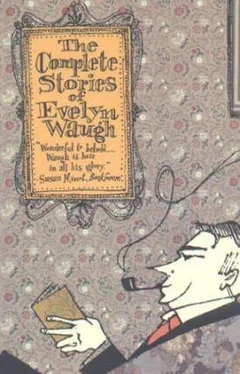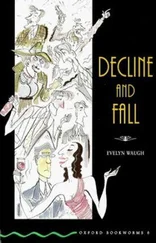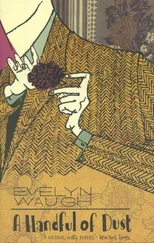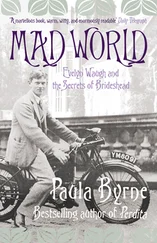Evelyn Waugh - The Complete Stories Of Evelyn Waugh
Здесь есть возможность читать онлайн «Evelyn Waugh - The Complete Stories Of Evelyn Waugh» весь текст электронной книги совершенно бесплатно (целиком полную версию без сокращений). В некоторых случаях можно слушать аудио, скачать через торрент в формате fb2 и присутствует краткое содержание. Год выпуска: 1998, ISBN: 1998, Жанр: Классическая проза, на английском языке. Описание произведения, (предисловие) а так же отзывы посетителей доступны на портале библиотеки ЛибКат.
- Название:The Complete Stories Of Evelyn Waugh
- Автор:
- Жанр:
- Год:1998
- ISBN:0-316-92546-2
- Рейтинг книги:3 / 5. Голосов: 1
-
Избранное:Добавить в избранное
- Отзывы:
-
Ваша оценка:
- 60
- 1
- 2
- 3
- 4
- 5
The Complete Stories Of Evelyn Waugh: краткое содержание, описание и аннотация
Предлагаем к чтению аннотацию, описание, краткое содержание или предисловие (зависит от того, что написал сам автор книги «The Complete Stories Of Evelyn Waugh»). Если вы не нашли необходимую информацию о книге — напишите в комментариях, мы постараемся отыскать её.
The Complete Stories Of Evelyn Waugh — читать онлайн бесплатно полную книгу (весь текст) целиком
Ниже представлен текст книги, разбитый по страницам. Система сохранения места последней прочитанной страницы, позволяет с удобством читать онлайн бесплатно книгу «The Complete Stories Of Evelyn Waugh», без необходимости каждый раз заново искать на чём Вы остановились. Поставьте закладку, и сможете в любой момент перейти на страницу, на которой закончили чтение.
Интервал:
Закладка:
From two in the morning until dawn “The Kremlin” is invariably full, and the American visitors, looking wistfully at their bills, often remark that Boris must be “making a good thing out of it.” So he is.
Fashions change very quickly in Montmartre, but if his present popularity lasts for another season, he talks of retiring to a villa on the Riviera.
One Saturday night, or rather a Sunday morning, Boris did me the honour of coming to sit at my table and take a glass of wine with me. It was then that Boris told his story.
His father was a general, and when the war broke out Boris was a cadet at the military academy.
He was too young to fight, and was forced to watch, from behind the lines, the collapse of the Imperial Government.
Then came the confused period when the Great War was over, and various scattered remnants of the royalist army, with half-hearted support from their former allies, were engaged in a losing fight against the Bolshevists.
Boris was eighteen years old. His father had been killed and his mother had already escaped to America.
The military academy was being closed down, and with several of his fellow cadets Boris decided to join the last royalist army which, under Kolchak, was holding the Bolshevists at bay in Siberia.
It was a very odd kind of army. There were dismounted cavalry and sailors who had left their ships, officers whose regiments had mutinied, frontier garrisons and aides-de-camp, veterans of the Russo-Japanese war, and boys like Boris who were seeing action for the first time.
Besides these, there were units from the Allied Powers, who seemed to have been sent there by their capricious Governments and forgotten; there was a corps of British engineers and some French artillery; there were also liaison officers and military attachés to the General Headquarters Staff.
Among the latter was a French cavalry officer a few years older than Boris. To most educated Russians before the war French was as familiar as their own language.
Boris and the French attaché became close friends. They used to smoke together and talk of Moscow and Paris before the war.
As the weeks passed it became clear that Kolchak’s campaign could end in nothing but disaster.
Eventually a council of officers decided that the only course open was to break through to the east coast and attempt to escape to Europe.
A force had to be left behind to cover the retreat, and Boris and his French friend found themselves detailed to remain with this rearguard. In the action which followed, the small covering force was completely routed.
Alone among the officers Boris and his friend escaped with their lives, but their condition was almost desperate.
Their baggage was lost and they found themselves isolated in a waste land, patrolled by enemy troops and inhabited by savage Asiatic tribesmen.
Left to himself, the Frenchman’s chances of escape were negligible, but a certain prestige still attached to the uniform of a Russian officer in the outlying villages.
Boris lent him his military overcoat to cover his uniform, and together they struggled through the snow, begging their way to the frontier.
Eventually they arrived in Japanese territory. Here all Russians were suspect, and it devolved on the Frenchman to get them safe conduct to the nearest French Consulate.
Boris’s chief aim now was to join his mother in America. His friend had to return to report himself in Paris, so here they parted.
They took an affectionate farewell, promising to see each other again when their various affairs were settled. But each in his heart doubted whether chance would ever bring them together again.
Two years elapsed, and then one day in spring a poorly-dressed young Russian found himself in Paris, with three hundred francs in his pocket and all his worldly possessions in a kitbag.
He was very different from the debonair Boris who had left the military academy for Kolchak’s army. America had proved to be something very different from the Land of Opportunity he had imagined.
His mother sold the jewels and a few personal possessions she had been able to bring away with her, and had started a small dressmaking business.
There seemed no chance of permanent employment for Boris, so after two or three months of casual jobs he worked his passage to England.
During the months that followed, Boris obtained temporary employment as a waiter, a chauffeur, a professional dancing-partner, a dock-labourer, and he came very near to starvation.
Finally, he came across an old friend of his father’s, a former first secretary in the diplomatic corps, who was now working as a hairdresser.
This friend advised him to try Paris, where a large Russian colony had already formed, and gave him his fare.
It was thus that one morning, as the buds were just beginning to break in the Champs Elysées and the couturiers were exhibiting their Spring fashions, Boris found himself, ill-dressed and friendless, in another strange city.
His total capital was the equivalent of about thirty shillings; and so, being uncertain of what was to become of him, he decided to have luncheon.
An Englishman finding himself in this predicament would no doubt have made careful calculations.
He would have decided what was the longest time that his money would last him, and would have methodically kept within his budget while he started again “looking for a job.”
But as Boris stood working out this depressing sum, something seemed suddenly to snap in his head.
With the utmost privation he could hardly hope to subsist for more than two or three weeks.
At the end of that time he would be in exactly the same position, a fortnight older, with all his money spent and no nearer a job.
Why not now as well as in a fortnight’s time? He was in Paris, about which he had read and heard so much. He made up his mind to have one good meal and leave the rest to chance.
He had often heard his father speak of a restaurant called Larne. He had no idea where it was, so he took a taxi.
He entered the restaurant and sat down in one of the red-plush seats, while the waiters eyed his clothes with suspicion.
He looked about him in an unembarrassed way. It was quieter and less showy in appearance than the big restaurants he had passed in New York and London, but a glance at the menu told him that it was not a place where poor people often went.
Then he began ordering his luncheon, and the waiter’s manner quickly changed as he realized that this eccentrically dressed customer did not need any advice about choosing his food and wine.
He ate fresh caviare and ortolansan porto and crepes suzettes; he drank a bottle of vintage claret and a glass of very old fine champagne, and he examined several boxes of cigars before he found one in perfect condition.
When he had finished, he asked for his bill. It was 260 francs. He gave the waiter a tip of 26 francs and 4 francs to the man at the door who had taken his hat and kitbag. His taxi had cost 7 francs.
Half a minute later he stood on the kerb with exactly 3 francs in the world. But it had been a magnificent lunch, and he did not regret it.
As he stood there, meditating what he could do, his arm was suddenly taken from behind, and turning he saw a smartly dressed Frenchman, who had evidently just left the restaurant. It was his friend the military attaché.
“I was sitting at the table behind you,” he said. “You never noticed me, you were so intent on your food.”
“It is probably my last meal for some time,” Boris explained, and his friend laughed at what he took to be a joke.
They walked up the street together, talking rapidly. The Frenchman described how he had left the army when his time of service was up, and was now a director of a prosperous motor business.
Читать дальшеИнтервал:
Закладка:
Похожие книги на «The Complete Stories Of Evelyn Waugh»
Представляем Вашему вниманию похожие книги на «The Complete Stories Of Evelyn Waugh» списком для выбора. Мы отобрали схожую по названию и смыслу литературу в надежде предоставить читателям больше вариантов отыскать новые, интересные, ещё непрочитанные произведения.
Обсуждение, отзывы о книге «The Complete Stories Of Evelyn Waugh» и просто собственные мнения читателей. Оставьте ваши комментарии, напишите, что Вы думаете о произведении, его смысле или главных героях. Укажите что конкретно понравилось, а что нет, и почему Вы так считаете.












